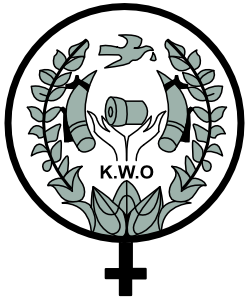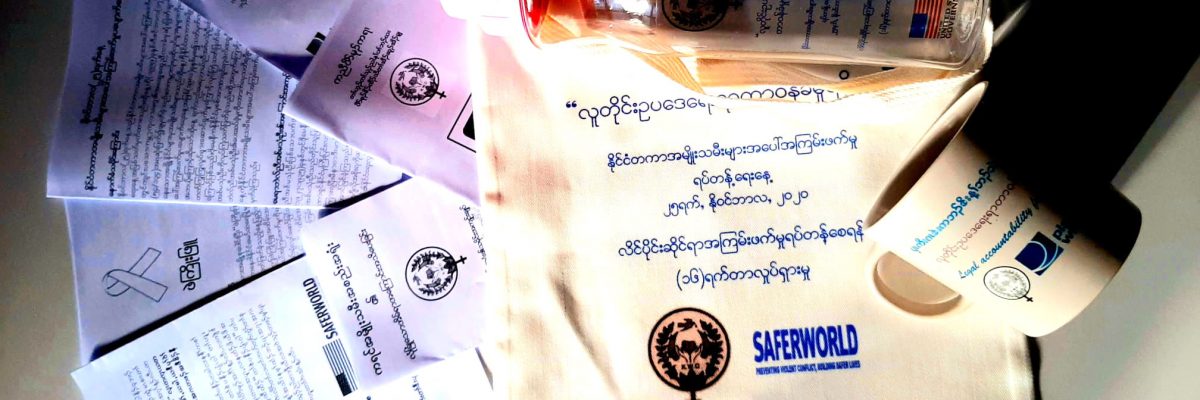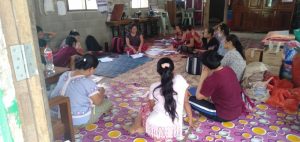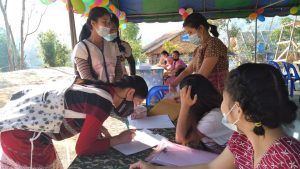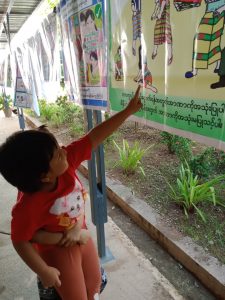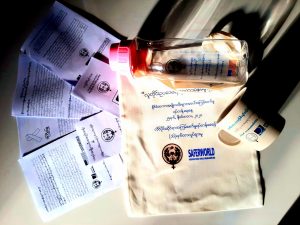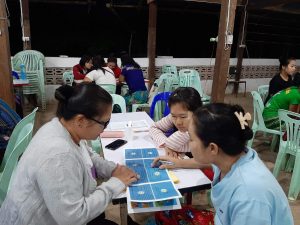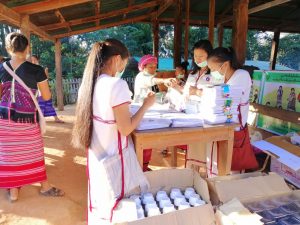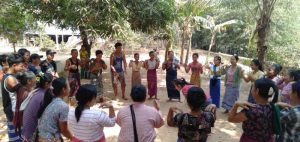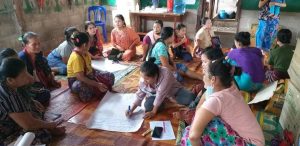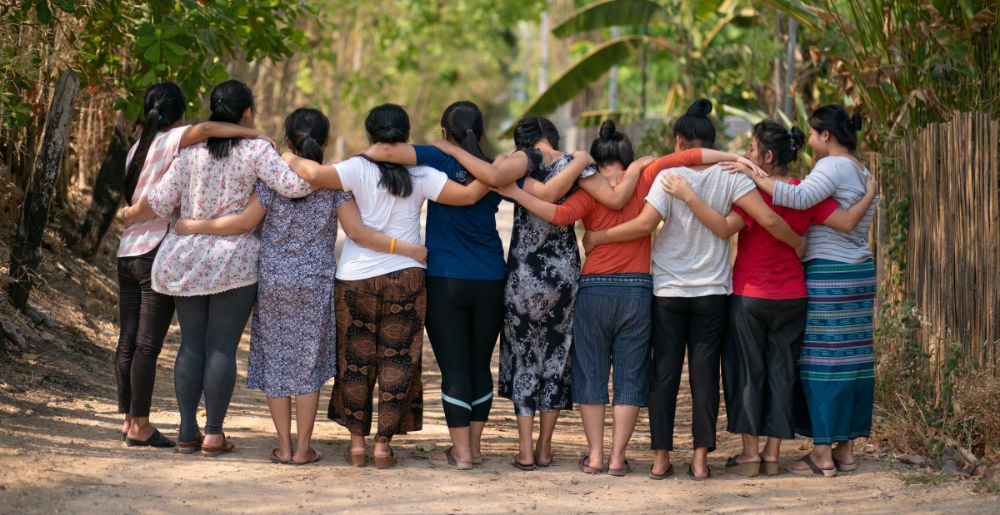Like women everywhere in the world, Karen women and girls suffer from violence. In Karen State violence is state-sponsored and perpetrated by soldiers of the Burmese military junta. Violence against women also occurs in our own communities perpetrated by members of our own community, and often it is husbands against their wives. In the refugee camps along the Thai-Burma border, women are safe from the violence of Burmese junta’s soldiers, but still women are victims of violence perpetrated by men in the community, and by Thai nationals. Domestic violence is quite common in both the refugee camps and in Karen State. Response from governance structures in the refugee camps and in Karen State, is extremely inadequate. KWO believes women and girls have a fundamental right to live without violence and without fear. We want violence against women to stop.
1. Project Goal
To reduce and respond to Sexual and Gender Based Violence (SGBV) through the provision of safe shelter, services and advocacy for women and child victims in our communities in the refugee camps and in Karen State.
2. Location
We implement this major project in all areas where KWO is present, a total of 14 sites, which are the seven Karen-majority refugee camps, and the seven districts in Karen State, Burma.
3. Overview
KWO has been the leading community-based provider of care and refuge for women and children at risk, including victims of SGBV, since the organisation was established more than 70 years ago. Women in trouble in the Karen community have always been given shelter in the homes of KWO members and leaders.
We set up the first “Safe House” in 2001 in refugee camps, and as years passed and resources and capacity increased we have expanded the project to support all our community work in women’s protection. We provide a wide variety of services, implement capacity building activities, and conduct advocacy at all levels of society to prevent, reduce, and respond to violence against women. This work is all done by women and takes place in our communities in Karen State, in the refugee camps, in Safe Houses, in homes, and on national and international platforms.
We operate safe houses in most sites so any woman or girl who is a victim of violence has always got a safe place to go. We provide care and support services to all victims, whether they are in a Safe House or at home. We organise lots of training for project staff, for KWO leaders, and for other community leaders so we, as service providers, have got the skills and understanding to support victims of violence and eventually we hope, to stop the violence. We conduct hundreds of sessions of awareness raising with members of the community every year, to empower, to educate, to inform, so that everyone can take part in the movement to stop violence against women. We consult with women, with the broader community, the leadership and with other ethnic groups, about what is wrong and what might work to fix it. We work with lawmakers to improve local laws and justice systems. We draft, edit, and produce policy documents, guidelines, training manuals, community education materials as resources to ensure the messages get through and that good results are sustainable.
4. Beneficiaries and Participants
In the 2023 project year:
- 364 women and girls who were victims of violence received direct services and care.
- 847 companions of the victims, mostly children, benefitted from services and care.
- 1,377 survivors of violence participated in “Survivor Exchange” sessions in 7 refugee camps and 3 sites in Karen State, and embraced the solidarity of their peers.
- 1,250 people working to provide services in the community received training. These were the KWO leaders in every site, this project’s staff, and other local leaders or service providers.
- At least 7,856 members of the community took part in awareness raising activities about women’s rights, Domestic Violence, and women’s health.
- More than 10,000 people attended special events and awareness raising activities for “Stop Violence Against Women Day” on November 25th and during the “16 Days of Activism Campaign”.
- 954 local leaders participated in 36 separate SGBV community co-ordination meetings organized by KWO. They were members of the justice system, local governance, health workers, and teachers.
5. Main Activities
The main services and activities in this project are:
- Victim support services including security, healthcare, counselling.
- Care for child victims, and for the children of adult victims.
- Advocacy with victim through justice system.
- Operate 12 Safe Houses.
- Home visit program for women at home.
- Provision of basic needs: food, clothing, hygiene supplies.
- Case Management.
- Accompaniment, advocacy, translation to health or justice services.
- Vocational training and peer support for survivors.
- Training of Trainers (TOT).
- Training to Project staff, to KWO leaders and to community leaders. Training included: Women’s Protection, Domestic Violence, Case Management, Child Protection and Child Protection Referral System (CPRS), the KNU Justice System, Social Welfare Programming, Safe House Management, and ARM-SOP Response Guidelines.
- Awareness raising about SGBV and women’s rights with community members.
- Produce and distribute Information, Education and Communication (IEC) materials. Dozens of separate items, in Karen language, and in Burmese, a few in English, and thousands of copies distributed.
- Action and advocacy for improvement in local laws and justice systems related to violence against women and child protection.
- Community consultations.
- Regular SGBV Co-ordination meetings with local organisations, community leaders, service providers, NGOs, etc.
In collaboration with community leaders in each site, KWO has established a “Safe House Committee” to ensure the support and participation of the community in the prevention and response to violence against women.
6. Who does the work?
In 2023, there were 60 project staff managing and implementing all the services and activities. This includes project managers based in town, and Field Co-ordinators, Safe House Carers, and Case Managers in the refugee camps and in Karen State. We also employed 3 babysitters to provide safe childcare for any project staff with young children, so they can continue to work.
In addition, all of KWO’s Social Welfare Program Co-ordinators in all sites and at all levels of the Karen community, from village, to township, to districts, and camps, provided support and services to women and girls suffering from violence, and assisted in the implementation of this project’s activities.
7. The Impact
Across the Karen community now there is a far greater awareness and understanding about violence against women, compared to 20 years ago. There is broad disapproval for perpetrators of violence, and people know more about rights, about what is a crime and where to go to get help.
Reporting of violence against women has increased enormously. Women feel safer to report, and are more confident they will receive protection and care. Thousands of women and children have received better quality care and support and been able to slowly recover from violence.
There is a community response mechanism in place in all sites now, thanks to KWO’s work over many years. There are clear response and referral procedures for SGBV cases that is community-owned and therefore understandable and practical. More resources have been allocated to this mechanism. The availability of policy documents, and guidelines in local languages and set in the local context ensure that essential knowledge and skills are accessible and the mechanism is sustainable.
Local laws and rules that relate to violence against women have greatly improved and continue to evolve. The system is changing and is getting better for women.
8. Current Context: Unfortunately, since the 2021 military coup, the escalating violence in Karen State has also led to an increase in violence against women being perpetrated by the soldiers of the Burmese Junta. With a huge rise in attacks on civilians and hundreds of thousands of Karen people displaced by air strikes and fighting, women are even more vulnerable than before. Many women are having to choose between fleeing their homes when the Burma Army is nearby or staying and risking the military’s violence, which includes using sexual violence as a weapon of war. This state-sanctioned violence against women and girls has been perpetrated with total impunity for many years and is intensifying.
